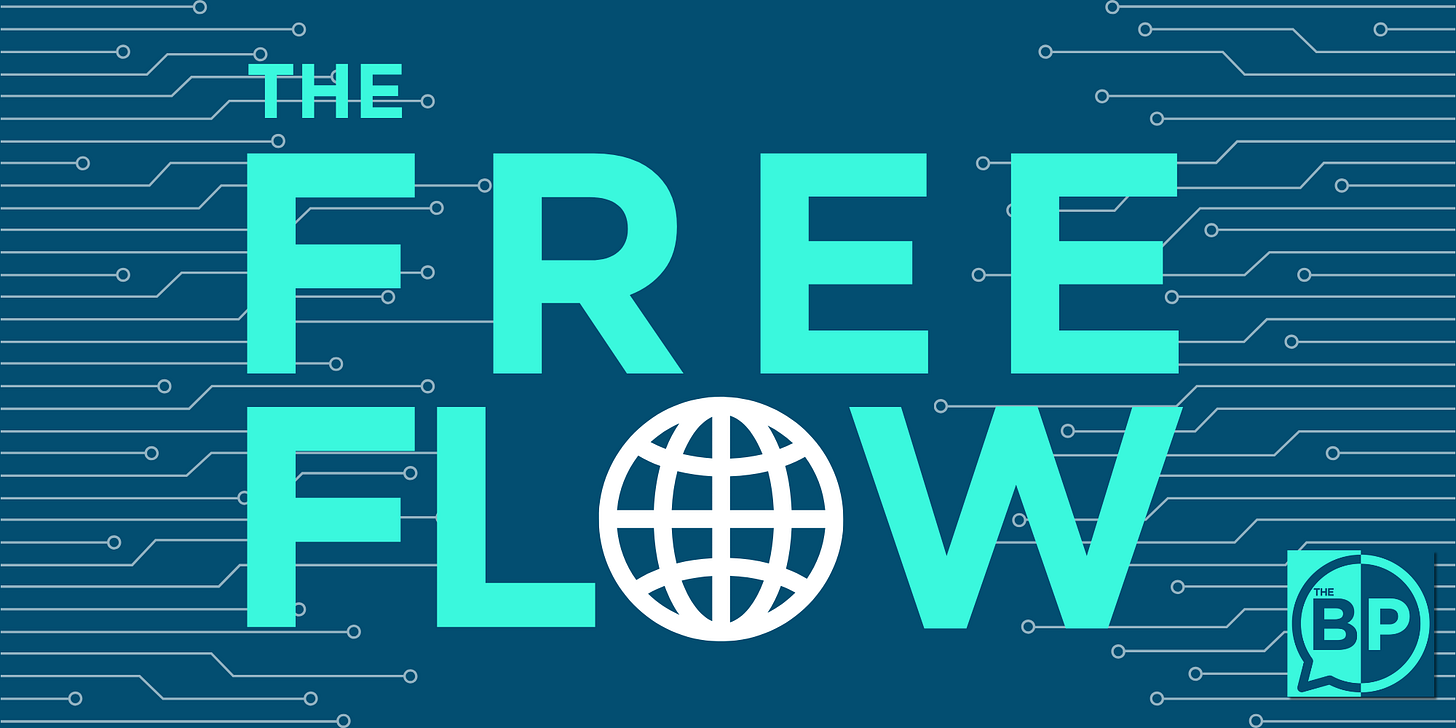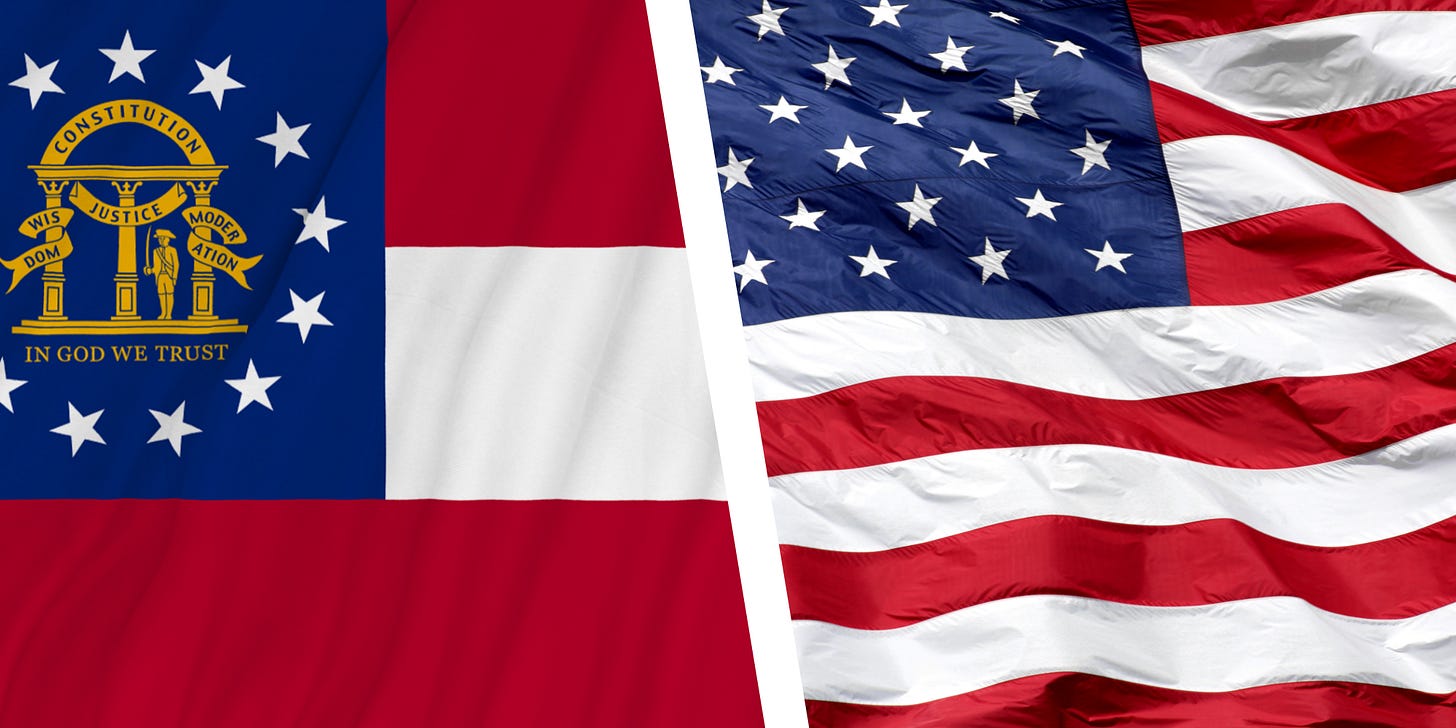The Free Flow — April 3, 2025
EU seeks consultation on democracy shield, UK's Online Safety Act sparks debate, Trump's AI Deregulation gets pushback from Republicans, FCC targets Disney and ABC over DEI, and more.
The Brussels Effect: Europe and Beyond
» European Commission Launches Consultation on ‘European Democracy Shield’
The European Commission has initiated a public consultation to gather input on the proposed ‘European Democracy Shield,’ which aims to safeguard democratic processes from disinformation, foreign interference, and information manipulation.
In a previous Free Flow, we discussed how the “democracy shield” program fits into broader efforts under Commission President Ursula von der Leyen to counter disinformation and other “harmful” online content— including €4.4 Million allocation to combat online hate speech.
The Shield is intended to complement existing EU frameworks such as the Digital Services Act and the European Media Freedom Act.
It comes amid heightened concerns over external actors influencing EU elections and broader democratic backsliding in some member states.
It is worth noting that, despite dire warnings prior to recent European elections, the EU’s own election observers in both 2019 and 2024 found no evidence that a significant disinformation campaign impacted outcomes. Independent researchers also reached similar conclusions about the 2019 and 2024 elections.
» Online Safety Act Sparks Global Debate
U.S. State Department expresses concern: U.S. State Department officials met with UK regulator Ofcom to express concerns that the UK’s Online Safety Act could infringe on freedom of expression.
The Act requires platforms to mitigate 130 “priority offenses,” but critics argue it incentivizes platforms to suppress legal content to avoid penalties.
U.S. intervention follows pressure from Trump administration officials such as JD Vance and Elon Musk, who have criticized UK penalties against social media users as violations of free speech.
Ofcom asserts that its enforcement focuses on illegal content rather than general censorship but has reportedly encouraged platforms to go “above and beyond” their legal duties in addressing harmful but legal content.
Baroness Kidron says OSA is watered down: In a wide-ranging interview, filmmaker-turned-digital-rights advocate Baroness Beeban Kidron called for stronger global regulation of Big Tech to safeguard creative industries and children.
Kidron, founder of the 5Rights Foundation and key architect of the UK’s Age Appropriate Design Code, criticized the Online Safety Act for being watered down and too focused on balancing tech and user interest rather than prioritizing a clear duty of care.
Kidron has also been a major driving force behind similar regulations adopted in states like California.
» World Economic Forum Releases Disinformation Roadmap
The Swiss-based World Economic Forum (WEF) published a report identifying digital disinformation as the greatest short-term risk facing world democracies.
Background:
The WEF report, The Intervention Journey: A Roadmap to Effective Digital Safety Measures, aims to identify “risk” associated with digital platform use and to recommend “safety by design” initiatives to build user trust.
The report mentioned that free speech could be undermined through AI-powered “content labeling systems,” which flag content for hate speech or misinformation.
Although the report does not focus primarily on online content moderation, its single mention of free expression underscores how free speech concerns are sidelined in discussions of platform regulation.
As Jacob Mchangama has pointed out, the threat from disinformation, deepfakes, and foreign influence on elections has yet to manifest in significant ways.
» EU Grants Wildlife NGO Trusted Flagger Status to Combat Online Trafficking
The International Fund for Animal Welfare (IFAW) has become the first wildlife conservation group to be formally appointed a Trusted Flagger under the EU’s Digital Services Act.
France’s digital regulator, ARCOM, granted the designation and compels online platforms to prioritize and act on IFAW’s reports of illegal wildlife trade content.
Under the DSA, failing to act on Trusted Flagger reports can result in fines of up to 6% of the platforms' global annual turnover.
Read more about our concerns with the DSA’s “Trusted Flaggers” in Natalie Alkiviadou’s recent post.
» Marine Le Pen barred from running for French president
Marine Le Pen’s plan to run in the 2027 French presidential election was cut short by a Paris court, despite being a front-runner in several polls.
Background:
All but one of Le Pen’s 24 co-defendants were found guilty on the accusation of embezzlement of European Parliament funds, facing a mix of fines, civic bans, and imprisonment.
Le Pen was fined €100,000, faces 4 years in prison, and is barred from running for the next 5 years. She leads the National Rally party, which was fined €2 million.
She was fined 100,000 euros and 4 years imprisonment—two years suspended, and the other two commuted to house arrest.
In Romania, another far-right candidate—Calin Georgescu—saw his November election victory overturned and has been barred from participating in a rerun of the election in May.
» EU to Enforce Social Media Laws Despite U.S. Pressure, Says Commissioner Virkkunen:
European Commission Executive Vice President Henna Virkkunen has affirmed that the EU will fully enforce the Digital Services Act (DSA) and Digital Markets Act (DMA), rejecting pressure from the U.S. and figures such as Elon Musk.
U.S. officials have criticized the laws as government overreach, with Trump threatening retaliatory tariffs under the guise of trade protection.
Virkkunen emphasized the EU’s commitment to tech sovereignty and market fairness.
Read more about why the DSA’s regulatory approach is worrying for freedom of expression online from Jordi Calvet-Bademunt and Joan Barata.
The Digital Age
» Republican States Push Back Against Trump’s AI Deregulation
Georgia becomes the latest state to push for more AI regulation, even as the Trump administration vows to deregulate the industry. Other states, like Virginia, are locked in a struggle over regulation.
Georgia joins other states:
Like other states, including Illinois and California, Georgia will criminalize the production of AI-generated obscenity, such as child pornography.
The state legislature also aims to crack down on the sale of user data, which could be used to train AI models. Nevertheless, the Georgia chapter of the ACLU argues the law fails to adequately protect user data.
For more on how other states are approaching AI regulations, read this month’s .exe-pression newsletter.
» FCC Targets Disney and ABC for DEI
Walt Disney Co. and ABC television network, which it owns, face a Federal Communications Commission (FCC) investigation into whether the parent company (Disney) and its subsidiary (ABC) violated equal employment opportunity regulations.
Background:
DEI refers to “diversity, equity, and inclusion” practices.
The FCC describes Walt Disney as "promoting invidious forms of DEI discrimination."
FCC Chair Brendan Carr’s probe will look at both current and discarded regulations, noting how the company has recently sought to distance itself from DEI policies.
Critics have argued that it is unclear whether the FCC has the authority to punish media companies for diversity initiatives, and some have equated this investigation to “bullying” tactics.
» Congress Holds Hearings on “Censorship Industrial Complex”
Both houses of Congress recently held hearings on pressure from both U.S. government agencies and private institutions colluding with tech platforms to suppress certain speech.
The Senate: On March 24, the Senate Judiciary Subcommittee on the Constitution held a hearing on the “Censorship Industrial Complex.”
Subcommittee Chair Senator Eric Schmitt (R-MO) warned of a “vast censorship enterprise” allegedly built by the Biden Administration involving cooperation between federal agencies, tech platforms, academics, and media to silence dissent under the guise of disinformation control.
He and other Republican senators argued this alliance poses a significant threat to free speech rights, especially for conservatives.
Senator Peter Welch (D-VT), the Subcommittee’s Ranking Member, disputed the censorship claims and cited 2024 Murthy v. Missouri, arguing “the Supreme Court rejected the allegation that government had unconstitutionally censored conservatives by pressuring social media companies to take down posts.”
The House: On April 1, the House Foreign Affairs Subcommittee on South and Central Asia held a hearing titled “Censorship-Industrial Complex: The Need for First Amendment Safeguards at the State Department.”
The House hearing focused on the Global Engagement Center (GEC), an initiative for countering foreign disinformation started under the Obama administration, but which was tasked under Biden to monitor US social media accounts as well.
Journalist Matt Taibbi shared that “GEC officials were largely concerned with domestic, English-language accounts — people with no ties to terror groups or relationships with adversary nations like Iran, China or Russia,” referring to his investigation of Twitter’s internal records, which Elon Musk provided upon buying the company, called the “Twitter Files.”
The "Twitter Files" purported to uncover government pressure on social media companies to censor certain news, such as The New York Post’s stories about Hunter Biden’s emails and discussions on COVID-19's origins (i.e, the lab-leak theory).
Nina Jankowicz, the former Biden appointee to a short-lived Disinformation Board, rejected the premise of the hearing, calling the so-called “Censorship Industrial Complex” a “fiction” used to stifle speech and research. She also argued that the Trump administration has committed worse First Amendment violations.
» Florida Lawmakers Advance Bill Requiring Media to Delete “False” Stories Online
A new Florida bill would require news outlets to permanently remove online content deemed “false” within 10 days of being presented with evidence of inaccuracy — or risk losing key defamation protections.
Background:
The bill was introduced after Florida news outlets covered a man’s arrest for molesting a child at a pool party ahead of prosecutors dropping the charges.
The law requires news outlets to remove content that is “untrue because of a court decision or because it received information that would convince a reasonable person that the report was untrue,” according to its Republican sponsor, Sen. Corey Simon.
The proposed bill comes during the third year in a row that Florida lawmakers have pushed for legislation to make it easier to sue media outlets over defamation.
Critics argue the law is too vague and could have a chilling effect on the media if it successfully weakens the legal standard needed to pursue a defamation case.
Press Freedom:
Serbian Journalists Targeted with Pegasus Spyware: New evidence shows two investigative journalists from the Balkan Investigative Reporting Network in Serbia were targeted with NSO Group’s Pegasus spyware in February 2025. Forensic analysis confirmed infection links sent via Viber to journalists “Bogdana” and Jelena Veljković were linked to Pegasus, using a Serbian state telecom number. The attacks came as both journalists were investigating high-level corruption and government ties to organized crime.
Russian Journalist Detained in Yakutia on Charges of “Justifying Terrorism”: On March 21, 2025, Russian authorities detained journalist Alexandra Alexandrova in Yakutia under Article 205.2(2) of the Criminal Code, which criminalizes the “justification of terrorism” online. Alexandra has been a vocal critic of Russia’s war in Ukraine and left the country after the 2022 invasion, citing the collapse of free journalism and civic life. She returned to Russia in 2024.
Russia Extends Sentence of Journalist Maria Ponomarenko in Crackdown on Anti-War Voices: On March 27, 2025, a district court in Shipunovo added 22 months to Maria Ponomarenko’s sentence. Ponomarenko was already serving six years for social media posts condemning the Russian bombing of the Mariupol Drama Theatre. The guards said Ponomarenko allegedly attacked them, although the charges have been widely denounced as fabricated.
Protest Watch:
Turkey Escalates Crackdown on Protestors: Last week’s Free Flow reported that over 340 people were detained during recent protests over Ekrem Imamoglu’s arrest. Recent reports indicate the conflict has escalated, with over 2,000 people, including 511 students, detained in Istanbul alone. Their lawyers said they have been housed with violent criminals, and numerous reports of police beating prisoners and refusing to inform them of their charges or their detainment location have surfaced.
UK Quaker House Raided, Pro-Palestine Activists Arrested: London police raided a Quaker meeting house and arrested six women affiliated with Youth Demand, a political activism group that campaigns for Palestine. Police said the cause of the raid was the group’s call to “shut down” London with protests next month. The raid follows 10 arrests of Youth Demand members and 11 home invasions, all of whom were released without charges.
Germany Moves to Deport Pro-Palestine Protesters Amid Free Speech Backlash: Berlin immigration authorities have issued deportation orders to four foreign residents — three EU citizens and one American — accusing them of “antisemitism” and “support for terrorism” due to their participation in pro-Palestine protests. Under German law, authorities may deport residents without a criminal conviction if the perceived threat is deemed sufficiently serious. The activists, who must leave Germany by April 21, are not an isolated case — lawyers report similar deportation actions targeting pro-Palestine speech. Read more from The Bedrock Principle about this worrying trend in the U.S. and abroad.
Quick Hits:
Imamoglu’s Lawyer Detained Amid Mass Arrests: Turkish authorities released Mehmet Phelivan, the lawyer representing jailed Istanbul Mayor Ekrem Imamoglu, after allegedly detaining him overnight for his legal counsel role. Phelivan’s lawyer said the arrest was intended as a “warning” for defending Imamoglu, and the mayor himself called the detention a “coup on democracy.”
Trump to Review Harvard Funding: The Trump Administration will review $9 billion worth of grants to Harvard University after revoking $400 million of Columbia funding and suspending $175 million for the University of Pennsylvania. The administration cites the university’s alleged failure to prevent antisemitism on campus, paralleling the accusations leveled at Columbia. Harvard removed the Director and Associate Director of its Center for Middle Eastern Studies ahead of the probe and adopted an expansive definition of antisemitism that includes criticism of Israel.
Musk Threatens Legal Action Against Tesla Critics: In a Fox News interview on March 27, Elon Musk vowed to “go after” those he accuses of spreading anti-Tesla “propaganda,” equating peaceful protest with acts of arson and vandalism against the company. Musk suggested he and President Trump will target the “real villains” through legal or federal means. His comments come as the grassroots Tesla Takedown movement, whose organizers have repeatedly denied any ties to vandalism, plan their largest coordinated demonstration to date.
Law Firms Sue to Block Trump’s Retaliatory Executive Orders: Jenner & Block and WilmerHale filed lawsuits on March 28 to stop the enforcement of executive orders issued by President Trump targeting them over past legal work. The orders bar the firms from conducting federal business and seek to strip key attorneys of security clearances, allegedly in response to their ties to the Mueller investigation. The firms argue that the orders amount to unconstitutional retaliation and violate the First Amendment rights of lawyers and clients. Some firms have opted to settle instead.
Italian Court Reverses Censorship of Disney Crime Series Title: A Disney-produced TV series depicting the real-life 2010 murder of a teenage girl in Aventrana, Italy, has regained its original title “Avetrana - This is not Hollywood” after an Italian court overturned a prior order that had forced the show to drop the town’s name.
Washington Unusually Vocal on UK Free Speech Case: Lord Sumption, a former UK Supreme Court Justice, has sharply criticized the U.S. State Department and Vice President JD Vance for what he described as an “unjustifiable interference” in British domestic affairs after comments on the prosecution of Livia Tossici-Bolt. Tossici-Bolt was charged for holding a sign reading “Here to talk if you want” outside a Bournemouth abortion facility, in violation of a buffer zone law. The U.S. criticism has been framed by British figures as part of a larger strategy by the Trump administration to pressure the UK over its Online Safety Bill and Digital Services Tax. We’ve also warned the Trump administration's commitment to free speech has been more hypocritical than principled.
Professor Wins Settlement Over University of Oregon Social Media Ban: After being blocked from a University of Oregon official social media account for commenting “all men are created equal” in response to a 2022 DEI post, Professor Bruce Gilley has secured a legal settlement vindicating his First Amendment rights. The case, filed in 2022, challenged the university’s viewpoint-based censorship on its public-facing X account. The settlement acknowledges that Gilley’s speech was protected and requires the university to adopt several speech-protective reforms.
Arkansas Federal Judge Strikes Down Social Media Age Verification Law: A U.S. District Court has permanently blocked Arkansas’s Act 689, which would have required all social media platforms to verify users’ ages and obtain parental consent for minors. Judge Timothy L. Brooks ruled the law is “constitutionally vague” and violates the First Amendment. The 2023 law was the first of its kind in the U.S., but NetChoice challenged it.
Spain’s Emeritus King Sues Politician for Alleged Defamation: Former King Juan Carlos I has filed a civil lawsuit against Miguel Ángel Revilla, ex-president of the region of Cantabria, over comments made during media appearances from 2022 to early 2025. The emeritus king is seeking €50,000 in damages, claiming the remarks violated his right to honor under Article 18.1 of the Spanish Constitution.
Publisher Halts Book Featuring Conversations With Killer Amid Public Outcry: Despite a Spanish court declining to block its publication, Spanish publisher Anagrama has suspended distribution of El Oido (The Hate), a novel based on prison conversations between author Luis Garcia Martin and convicted child killer Jose Breton. The mother of the murdered children, Ruth Ortiz, who had not been informed of or consulted during the writing process, filed the initial complaint.







